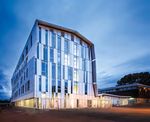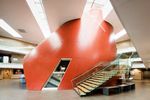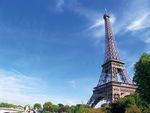APPLIED TO SMART CITIES - Artificial Intelligence & Engineering AN INTERNATIONAL SUMMER SCHOOL IN FRANCE
←
→
Page content transcription
If your browser does not render page correctly, please read the page content below
Artificial Intelligence & Engineering
APPLIED TO SMART CITIES
PROGRAM TAUGHT IN ENGLISH
AN INTERNATIONAL SUMMER SCHOOL IN FRANCE
July 6th to 15th, 2020 (ESTP Paris) I July 16th to 24th, 2020 (EPF Troyes)AN INTERNATIONAL SUMMER
SCHOOL OF APPLIED SCIENCES
2-MODULE PROGRAM TAUGHT IN ENGLISH
OVERVIEW A STIMULATING LEARNING
This program offers an in-depth study on
ENVIRONMENT!
topics related to the application of artificial
• Lectures & workshops on real projects
intelligence (AI) and various new technologies
• Introduction to Research
integrated in smart cities and built
• Networking opportunities
environments. AI’s impacts on the planning
• Enriching multicultural experience
and designing of urban areas as well as the
• Case studies with the support of local
management of cities will also be covered.
authorities
Courses will give an overview on how big
data, together with Internet of Things (IoT),
AI and Machine Learning are being applied
in every field of society, especially where
complex decisions need to be made with
numerous stakeholders.
Students will learn more about AI’s
potential to solve problems related to rapid
urbanization including mobility challenges,
energy shortage, health and environmental
issues as well as to provide comfort, security
and resilience in built environments.
STUDENTS’ PROFILE
Another course will focus on how AI could be
a relevant tool to tackle social problems on Open to English-speaking Bachelor or
a city scale by promoting citizen-centered Master students with a background in
applications, crowdfunding projects and Architecture, Urban Planning, Computer
collaborative open data platforms. Sciences, Engineering or any related fields.ACADEMIC TOPICS
Students can participate in one or
both modules:
Module 1
New Technologies applied July
to Intelligent Cities and 6-15, Paris-Cachan
Smart Environments 2020
Module 2
Artificial Intelligence
July Troyes
and Big Data in Urban
16-24, (Champagne
Planning, Design and
2020 Region)
Management
The following subjects will be
covered:
• Smart cities, Smart grid, Smart building
• AI for climate change mitigation
• Big data, artificial intelligence and machine
learning for sustainable development CULTURAL VISITS AND
• Citizen science and public engagement in
smart cities FIELD TRIPS
• Digital revolution and AI challenges
Besides the academic lectures,
Each module includes: complementary field trips and project site
visits, a cultural program will allow students
• 20 hours of lectures and supervised to discover 2 of the most beautiful areas of
teamwork France: Paris & the Champagne region.
• 1 real project
• 1 session of French culture (theatre, French They will discover the splendid cultural
cuisine workshop, etc.) heritage of France’s capital city and the
• 1 meeting session with researchers and lab Parisian world renowed for its cultural life
visits including world famous theatres, museums,
• 2 cultural visits architectures and excursions on Seine River.
• 1 welcoming lunch and 1 farewell cocktail
They will visit the wonderful medieval city
At the end of each module, and upon of Troyes famous for its architecture, stained
success, students may obtain a certificate glasses and also the Champagne vineyards in
and 3 Credits (ECTS). the Champagne-Ardennes region.
All students will be initiated to the French
language in addition to cultural visits, which
Note: Program content may be subject to change or will contribute to a perfect understanding of
cancellation based upon low enrollment the local social and professional environment.APPLICATION AND FEES “The summer school program has enabled
me to have a clear view of how to implement
The program fee of 750 € per module covers: our theoretical knowledge in practical
aspects.The visits of Challenger, Bouygues
• Tuition and documentation headquarters,Troyes tourist information
• Welcome and farewell events building, and many others, gave us a realistic
• Access to EPF and ESTP Paris facilities approach of the building.The summer
• Free internet access program taught us how to handle problems
• Official programme certificate keeping in mind the required norms and
• Cultural and social events regulations of building.The experience in
• Accomodation may be arranged upon France has helped me widen my vision by
request (+ 350 € supplementary per working with international architects and
module, if available) students having different creativity and
thinking criteria.The main aim of coming
to France was to analyze the studies being
Living expenses, individual insurances and
carried out there and I can surely say that
visa fees are not included. I would love to go back to France for my
master’s degree.This whole experience (the
Applications on www.epf.fr/en visits, lectures and workshops), really helped
me enrich my knowledge and skills.”
Himanshi, India
19
APPLICATION DEADLINE
April 19, 2020ABOUT EPF - Ecole d’ingénieur-e-s Founded in 1925 and located in Sceaux, Troyes and Montpellier, EPF is one of the best post- secondary School for general engineering sciences. In 1991, EPF - Graduate School of Engineering - acquired the status of Public Foundation and became co-educational in 1994. EPF offers to its 2 400 students a year (including 15% of international students) a five-year post-secondary engineering sciences curriculum. First three years consist in a general curriculum. In 4th year, students chose among 8 different majors: Aeronautics & Space, Structures & Materials, Engineering & Health, Engineering & Management, Engineering & Digital technologies, Energy & Environment, Buildings & Eco-cities and Data Engineering. EPF’s diplomas are accredited by the French Ministry of Higher Education and Research and the “Commission des Titres d’Ingénieurs”. EPF is a member of both the “Conférence des Grandes Ecoles” (CGE) and the “Union des Grandes Ecoles Indépendantes” (UGEI). EPF’s curricula favors a faster integration into the job market with one of the highest starting salaries amongst post-secondary schools. More than 12 000 graduated engineers from EPF are spread out within the industry and service sectors. ESTP Paris Ecole Spéciale des Travaux Publics, du Bâtiment et de l’Industrie was founded in 1891 as a private higher education institution and officially recognized by the French government in 1921. Its degrees are accredited by the Ministry of Higher Education & Research and the ‘‘Commission des Titres d’Ingénieurs” (CTI). Several training programmes have been awarded quality labels, such as EUR-ACE & RICS. In France, ESTP Paris counts over 2 800 students, a network of 45 000 Alumni and trains the biggest students flow for the construction industry and has made its reputation as THE “Grande Ecole” for professionals in this area: construction, planning & development, project and facilities management, sustainable buildings & infrastructures, design, rehabilitation, maintenance, real estate, topography-surveying, materials, energy efficiency, building information modelling, etc. The main characteristics of ESTP Paris are its close links to industry, its strong international relations (88 partner universities in 40 countries), its equal opportunities policy and the emphasis put on sustainable development.
CONTACT
ESTP Paris
28, Avenue du Président Wilson
94230 Cachan - France
information.summer@estp-paris.eu
Décembre 2019. Document non contractuel. Ne pas jeter sur la voie publique. Conception : trente-fevrier@orange.fr. Photos : EPF, ESTP, Fotolia
EPF - Graduate School of Engineering
3 bis rue Lakanal
92330 Sceaux - France
international@epf.fr
Let’s discover the previous experience on:
http://bit.ly/SummerSchoolESTPParisEPFYou can also read


























































